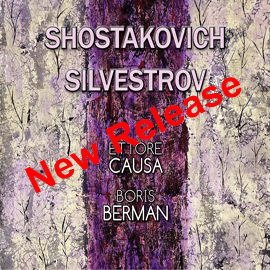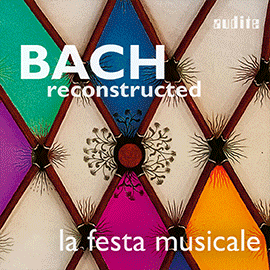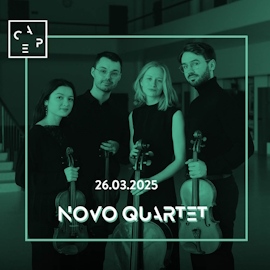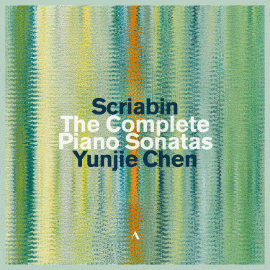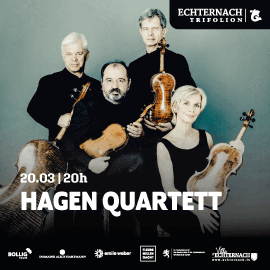Dieses Programm beginnt mit einem Konzert von Bohuslav Martinu, dem man den Titel ‘Ungleicher Kampf’ geben könnte. Der erste Satz ist kontrastreich und gibt zunächst dem Klavier Raum, sich zu entfalten. Das Cembalo gibt sich unbeeindruckt und murmelt schmuylenhaft vor sich hin, verlangt nach mehr, muckt auf. Im Adagio kann es sich behaupten, das Orchester scheint das Cembalo zu mögen, umgarnt das Instrument liebevoll.
Das Finale beginnt mit kräftigem Orchestersatz und einem herrisch auftretenden Klavier. Dieser Gruppe tritt schmächtig das Cembalo gegenüber und kämpft ums Überleben. Esfahani und Liebreich geben alles, um diese Musik auf diese Art wirksam werden zu lassen.
Hans Krasa wurde 1899 als Sohn einer deutschen Mutter und eines tschechisch-jüdischen Rechtsanwalts geboren. Er wuchs in Prag auf, das nach dem Zusammenbruch der Habsburger Monarchie eine sehr kosmopolitisch-liberale Stadt mit einem niveauvollen und regen Künstlermilieu war. Die Nazis bereiteten dem freilich 1938 brutal ein Ende. Krasa wurde 1942 nach Theresienstadt deportiert und 1944 in Auschwitz ermordet.
Seine Kammermusik für Cembalo und 7 Instrumente aus dem Jahr 1936, in der sich Krokant, Meringue, Praline und Fondant vermischen, ist auf dieser CD in einer spannenden Aufführung zu hören.
Das dritte Werk, ein Konzert für Cembalo und Streicher, stammt vom tschechischen Komponisten Victor Kalabis (1923- 2006). Er komponierte es 1975 für seine Frau Zuzana Ruzickova – deren letzter Schüler Mahan Esfahani war.
Das Konzert besteht aus drei Sätzen. Die Ecksätze sind kräftig formuliert, und das Cembalo brilliert als Soloinstrument. Das Andante könnte man eine Art nachdenkliche Elegie mit einigen harschen Einschüben bezeichnen.
Der erste Satz bekommt in dieser Aufnahme einen pulsierend drängenden Charakter, mit kräftigen Streichergesten und sehr rhetorischen Aussagen des Cembalos. Das Andante wird sehr ausdrucksvoll und leidenschaftlich gespielt.
Das Finale ist anfangs hektisch, hoch virtuos im Cembalopart, und Esfahani spielt atemlos, wie besessen, um dann im langsamen Mittelteil dieses zerklüfteten Satzes umso expressiver zu werden. Mit aufgeladenen Batterien nimmt der Satz wieder seinen frenetischen und hoch intensiven Lauf, um in eine eher desolat-tragische Coda zu münden.
Das ist alles so spannend, dass man sofort das ganze Programm nochmal hören will…
This program begins with a concerto by Bohuslav Martinu, which could be titled ‘Unequal Struggle’. The first movement is rich in contrast and at first gives the piano room to unfold. The harpsichord is unimpressed and murmurs to itself in a Schmuyle-like manner, asking for more, even mucking up. In the Adagio it can assert itself, the orchestra seems to like the harpsichord, lovingly ensnares the instrument.
The finale begins with a powerful orchestra and an imperious piano. The harpsichord faces this group with lankiness and fights for survival. Esfahani and Liebreich give their all to make this music effective in this way.
Hans Krasa was born in 1899 to a German mother and a Czech-Jewish lawyer. He grew up in Prague, which after the collapse of the Habsburg monarchy was a very cosmopolitan-liberal city with a sophisticated and lively artistic milieu. The Nazis put a brutal end to this in 1938. Krasa was deported to Theresienstadt in 1942 and murdered in Auschwitz in 1944.
His Chamber Music for Harpsichord and 7 Instruments from 1936, in which brittle, meringue, praline and fondant mingle, can be heard on this CD in an exciting performance.
The third work, a concerto for harpsichord and strings, is by Czech composer Victor Kalabis 1923- 2006). He composed it in 1975 for his wife Zuzana Ruzickova – whose last pupil was Mahan Esfahani.
The concerto consists of three movements. The corner movements are strongly worded, and the harpsichord shines as a solo instrument. The Andante could be called a kind of reflective elegy with some harsh interjections.
The first movement takes on a pulsatingly urgent character in this recording, with powerful string gestures and very rhetorical statements by the harpsichord. The Andante is played very expressively and passionately. The finale is frantic at first, highly virtuosic in the harpsichord part, and Esfahani plays breathlessly, as if possessed, only to become all the more expressive in the slow middle section of this jagged movement. With batteries charged, the movement resumes its frenetic and highly intense course, culminating in a rather desolate and tragic coda.
It’s all so exciting that one immediately wants to hear the whole program again….














